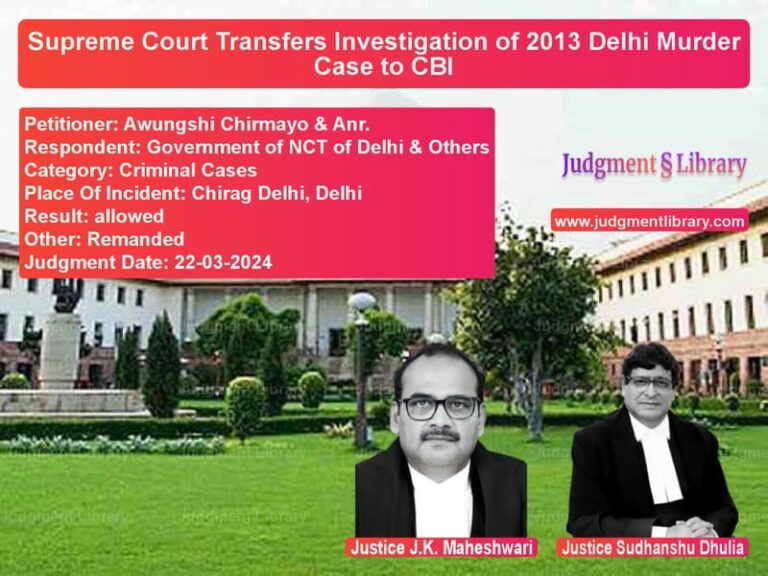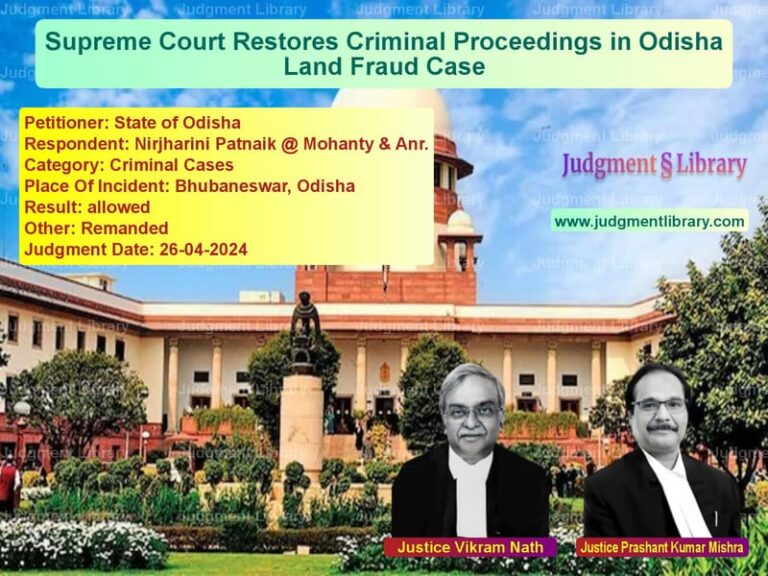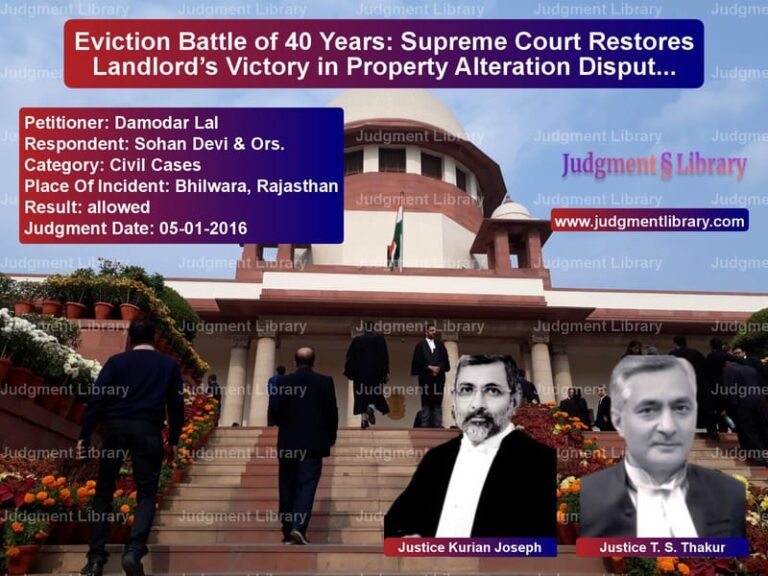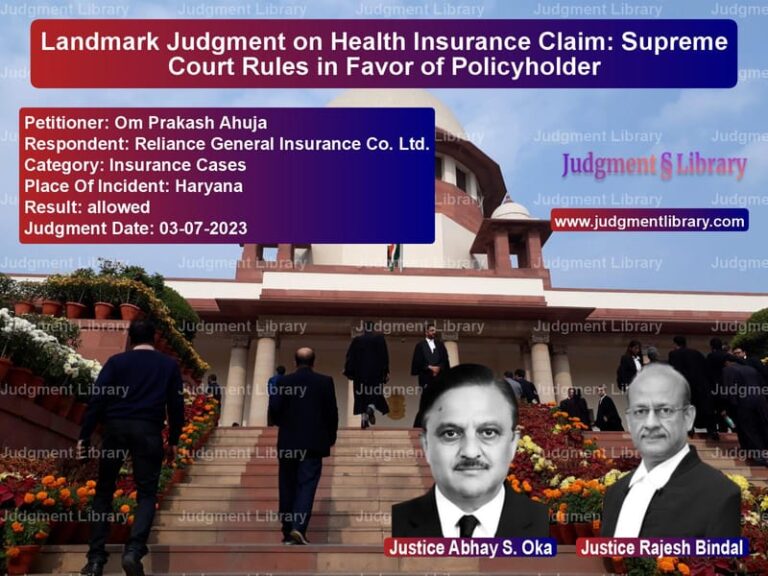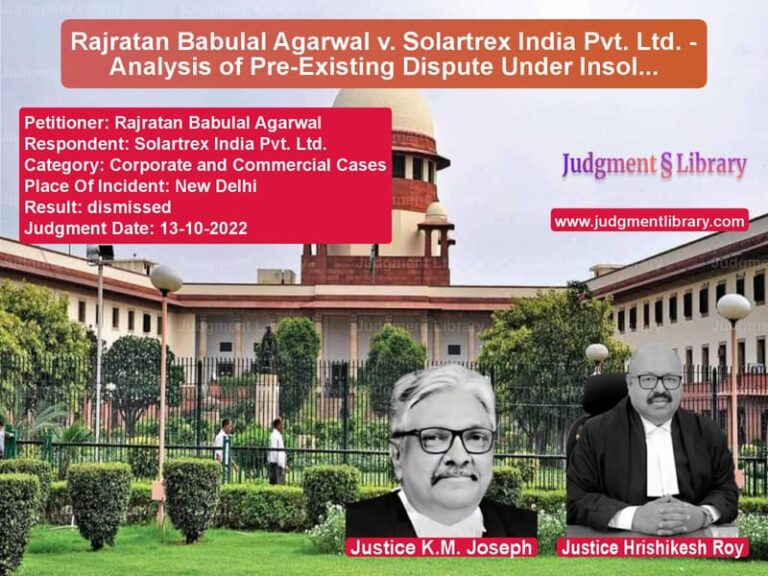State Bank of India Disciplinary Action: Supreme Court Reinstates Bank’s Authority
The case of State Bank of India & Ors. vs. Mohammad Badruddin is a crucial ruling concerning disciplinary actions in banking institutions. The Supreme Court reversed the Jharkhand High Court’s decision, which had set aside the punishment imposed on the respondent due to procedural lapses. This judgment emphasizes the significance of due process, the role of natural justice, and the proper application of disciplinary rules in financial institutions.
The dispute arose from the disciplinary proceedings initiated by the State Bank of India (SBI) against Mohammad Badruddin, an officer accused of financial irregularities. The disciplinary authority imposed severe penalties, but the High Court overturned them, citing procedural lapses. The Supreme Court restored the penalties, reinforcing the principle that minor procedural deviations do not automatically invalidate disciplinary proceedings.
Background of the Case
The disciplinary proceedings against Mohammad Badruddin stemmed from his actions while serving as a bank officer. Two primary sets of charges led to two separate disciplinary proceedings:
- One proceeding resulted in his compulsory retirement, later modified by the appellate authority to reversion to a lower post.
- The second proceeding led to his removal from service due to financial misconduct and negligence.
The respondent challenged both disciplinary actions in separate writ petitions. The High Court ruled in his favor, setting aside the punishments based on procedural lapses, specifically the non-supply of the inquiry report before the disciplinary authority made its decision.
Petitioner’s Arguments
The State Bank of India, represented by its legal counsel, made the following arguments:
- The punishment orders were justified based on substantial evidence of financial irregularities.
- The High Court misapplied the principles of natural justice by setting aside the disciplinary actions solely due to procedural lapses.
- The non-supply of the inquiry report was not a fatal flaw, as it was provided along with the punishment order.
- The Supreme Court’s ruling in Managing Director, ECIL v. B. Karunakar (1993) established that procedural lapses must be examined for their actual impact on the case.
- The High Court failed to consider that the respondent had already been given an opportunity to present his case before the disciplinary authority.
Respondent’s Arguments
The respondent, Mohammad Badruddin, countered with the following points:
- The disciplinary authority’s decision was vitiated by procedural lapses, particularly the failure to provide the inquiry report before punishment was imposed.
- The disagreement with the inquiry officer’s findings should have been communicated to him before finalizing the punishment.
- The High Court correctly applied the principles of natural justice in setting aside the punishments.
- The bank acted arbitrarily by relying on past disciplinary actions without informing the respondent.
Supreme Court’s Observations
The Supreme Court, comprising L. Nageswara Rao and Hemant Gupta, analyzed the procedural and substantive aspects of the case and made the following observations:
- The High Court erred in setting aside the disciplinary action solely due to non-supply of the inquiry report before the punishment was imposed.
- The Constitution Bench ruling in B. Karunakar (1993) clarified that procedural lapses should only lead to setting aside a disciplinary action if they caused actual prejudice to the employee.
- The disciplinary authority had sufficient grounds to impose the punishments based on financial misconduct and negligence.
- The past disciplinary actions were correctly considered in determining the penalty.
- The respondent had an opportunity to defend himself during the inquiry, mitigating the impact of the procedural lapse.
Critical Judgment Excerpt: “Since the order of punishment was passed by the Disciplinary Authority prior to November 20, 1990, therefore, the same could not be set aside only for the reason that the copy of the Inquiry Report was not supplied to the delinquent. Consequently, the order of the High Court in LPA No. 261 of 2007 is set aside, and the order of punishment is ordered to be restored.”
Final Decision
The Supreme Court allowed SBI’s appeal and restored the punishments imposed on the respondent. The key rulings were:
- The High Court’s decision was incorrect in setting aside the punishment due to minor procedural lapses.
- The disciplinary actions were valid and justified based on the evidence.
- The past conduct of the respondent could be considered in determining penalties.
- The case was remanded to the disciplinary authority to determine the respondent’s back wages and terminal benefits.
Implications of the Judgment
This ruling has significant implications for disciplinary proceedings in banking and other financial institutions:
- Procedural lapses do not automatically invalidate disciplinary actions unless they cause actual prejudice.
- Banking institutions must ensure strict adherence to disciplinary procedures but can rely on past conduct in determining penalties.
- Courts should not interfere in internal disciplinary matters unless there is clear evidence of unfair treatment.
- Employees facing disciplinary proceedings must be aware that past misconduct can be considered in determining penalties.
The Supreme Court’s decision in State Bank of India vs. Mohammad Badruddin reinforces the principle that disciplinary actions must be assessed based on substantive evidence rather than minor procedural flaws. This ruling provides clarity on the application of natural justice in banking sector disciplinary proceedings.
Petitioner Name: State Bank of India & Ors..Respondent Name: Mohammad Badruddin.Judgment By: Justice L. Nageswara Rao, Justice Hemant Gupta.Place Of Incident: Jharkhand.Judgment Date: 16-07-2019.
Don’t miss out on the full details! Download the complete judgment in PDF format below and gain valuable insights instantly!
Download Judgment: State Bank of India vs Mohammad Badruddin Supreme Court of India Judgment Dated 16-07-2019.pdf
Direct Downlaod Judgment: Direct downlaod this Judgment
See all petitions in Disciplinary Proceedings
See all petitions in Judgment by L. Nageswara Rao
See all petitions in Judgment by Hemant Gupta
See all petitions in allowed
See all petitions in Remanded
See all petitions in supreme court of India judgments July 2019
See all petitions in 2019 judgments
See all posts in Service Matters Category
See all allowed petitions in Service Matters Category
See all Dismissed petitions in Service Matters Category
See all partially allowed petitions in Service Matters Category


